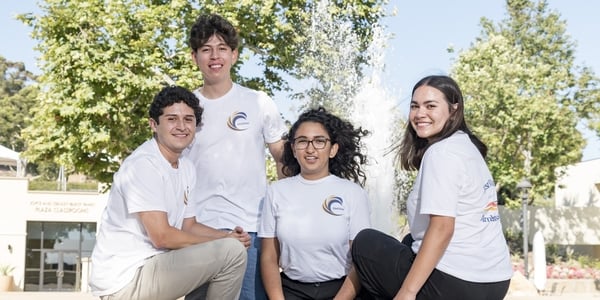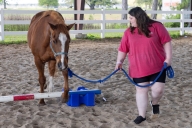You have /5 articles left.
Sign up for a free account or log in.

The First Wave Ambassador program at Pepperdine University promotes mentorship and connection among first-generation college students on campus. The initiative also builds into the university's first-generation support network, which includes first-gen faculty and staff.
Pepperdine University
For students who are the first in their families to attend college or complete a college degree, navigating campus can be difficult. At Pepperdine University, a student support program for first-generation students provides mentors and allies for learners.
The First Wave program, named after the university’s mascot, the Willie the Wave, began in 2016 as a formalized initiative to make first-generation students more visible and help them build community, explains Marissa Davis, director of student success.
Over the years, staff has expanded opportunities for campus stakeholders—including more senior first-gen students, faculty and staff—to lead and guide first-generation students, creating a campus of care.
The background: Around 17 percent of Pepperdine’s undergraduate students are first-generation college students, or learners whose parents or legal guardians have not obtained a bachelor’s degree, according to 2022 data.
Nationally, first-generation students face unique challenges in navigating college because, for many, their parents have never enrolled in college or have not earned a bachelor’s degree.
At Pepperdine, first-generation students are often confronted with a cultural adjustment. One reason is that the small, faith-based institution has its own norms, and another relates to having to find peers who share their identities on campus, says Cory Robertson, assistant director of student success.
First-gen learners are often high achieving but can be hesitant to seek help, which is where First Wave steps in, providing academic resources and tools to help learners succeed, as well as people who understand their needs, including an advisory council, ambassador group and directory of first-gen personnel at Pepperdine.
First-gen partners: First Wave receives support from the First Wave Advisory Council, made up of first-generation faculty and administrators, representing a variety of departments and roles, Davis says.
The advisory board helped develop the First Wave program, identifying the types of support and services a first-gen student may need at Pepperdine.
“It brought a lot of different people to the table [who] had different roles on campus that interact with students at different points,” Davis explains, from faculty who understand curricular needs of students to admissions and financial aid who could speak to deadlines and resources on campus. The advisory council also helps expedite internal processes because stakeholders are embedded throughout campus.
Now, the advisory board meets periodically to discuss the program or to address relevant first-generation issues on campus.
Peer connections: In 2019, the program added student ambassador positions. Each year, members of a committee within the First Wave Advisory Council select four student leaders who are first-generation learners to serve as mentors and provide a student voice to programmatic efforts.
The ideal student ambassador is involved on campus, has shown leadership capabilities in the past, has passion for supporting the first-gen community and is excited to mentor future students, Davis says. Selected students commit to serving for one year and receive training prior to the start of the fall term.
First Wave Ambassadors serve as referral guides to campus and provide weekly office hours within the Student Success Center. They also organize events throughout the academic year, including a Family Welcome during new student orientation and National First-Generation College Celebration Day.
“We thought it was really important that there’s a student-led agency versus [staff] to connect with on campus,” Davis explains. “They really help us get a sense of the pulse of students, what students are looking for, how they want to connect.”
In addition to visiting ambassadors’ office hours, students can connect with the peer leaders through booking an appointment online via social media or by filling out an email form, making help accessible.
“I think there’s a lot of reassurance both to first-gen students, but also the first-gen families knowing that—even if they decide not to use the peer mentors—that they are there, and that it makes a statement saying that the university cares,” Davis says.
Each ambassador receives a $5,000 annual scholarship for their efforts, funded by the Student Success Center and donor support. The leaders also gain professional development opportunities, presenting at board meetings, engaging with the advisory council and more.
Recently, two First Wave Ambassadors joined other students in resurrecting the First-Gen Club on campus, creating a purely social sphere for students to network and connect with one another.
An ocean of support: If students are looking for help from a higher education practitioner, they can also turn to the first-generation faculty directory.
The Student Success Center partnered with Nataria Joseph, associate professor of psychology who has completed research on first-generation students, to establish the directory.
“We wanted students who didn’t have easy access to the hidden curriculum, or really the different resources at Pepperdine, to be able to connect with faculty who they themselves were former first-generation students, or allies,” Davis says. “It gives [students] the opportunity to relate with someone who has had a similar life experience.”
Faculty members who opt into the directory share stories of their time as undergraduate students and their field of study to help students find mentors or supportive people on campus.
The directory also includes first-generation allies, who may not be the first in their family to attend or complete higher education, but who are sympathetic to the experiences of first-gen learners and can also provide support.
Continuing the wave: In the future, Student Success staff hope to engage more with first-generation alumni to support current and future learners.
At present, First Wave recognizes students and alumni at the First Generation Senior Banquet in the spring, selecting one alum as the recipient of the First-Gen Legacy Award for outstanding accomplishments that can inspire the university’s first-gen community.
If your student success program has a unique feature or twist, we’d like to know about it. Click here to submit.








